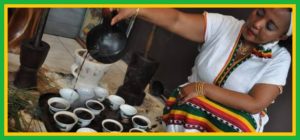Important trave information!

Once you read the important instructions below you could be able to travel with out any trouble.

There are a few things you should know before you travel in Ethiopia. This is a country like no other, that will blow your mind with its sheer beauty; but where traveling is by no means easy.
I wish I had better prepared for the trip, read a bit more about the challenges that it presents, for this would have made my life much easier – or at least I wouldn’t have been so frustrated when things went (repeatedly) wrong.
In this post I will do my best to highlight all the things you need to know before you travel in Ethiopia, hoping that you’ll go there with plenty of information on what to expect, and tips that will help you fully enjoy your trip.
Travel in Ethiopia
People in Ethiopia are very friendly

33 Important Things To Know About Travel In Ethiopia
It’s more populated than you may think
Most people who have yet to travel in Ethiopia have no idea how big the country is. Ask your friends and family to tell you how many people live in Ethiopia and they will shoot random numbers – 20 million! 12 million! – each of them wrong.
According to the World Bank, in 2018 more than 109 million people lived in Ethiopia. Ethiopia capital Addis Ababa counts more than 7 million, according to official data – though apparently the actual number is closer to 10 million. In other words, Ethiopia is a huge country and it is very highly populated, though there are some areas which are almost completely uninhabited due to the harsh climate conditions.
People are generally friendly

The first think you’ll notice when you travel in Ethiopia is how friendly people are. Locals are generally curious to know where you are from, what you are doing and whether you are enjoying the country. They will take a chance to practice a little English with you whenever they can. They are very social – you’ll often spot them sitting in coffee shops enjoying coffee, or hanging out in the streets and square, chatting to friends.
More than anything else, Ethiopians love dancing – from the traditional dances you’ll have a chance to see at a “cultural restaurant” to the more informal ones at parties, don’t miss the opportunity to mingle with them and learn some moves (though I shall warn you, Ethiopians have the moves, and you won’t be able to replicate them!).
The only area where people appear to be less friendly is the Danakil region, home of the Afar region. Most Ethiopians accuse the Afar of being “crazy and unpredictable,” and impossible to work with. I don’t like giving such extreme judgements, and my experience is too limited to express an informed opinion. Sure enough, the hardship and isolation in which they live doesn’t help establishing relationship with visitors.
Castle of Gondar
Fasil Ghebbi Castle is one of the UNESCO sites of Ethiopia
There are 9 UNESCO sites
You will quickly learn when you travel in Ethiopia that Ethiopia has more UNESCO sites than any other African country. The most famous one is the Rock Hewn Churches of Lalibela. Among other UNESCO sites there are Fasil Ghebbi Castle in Gondar; the Simien Mountains; and Aksum.
The landscape is breathtaking
With highlands, high mountains, a high volcanic plateau and a desert depression, Ethiopia has a variety of ecosystems and – with that – a variety of climates. You can rest assured that the landscape in this part of the world is absolutely stunning.
When you travel in Ethiopia, you are inevitably mesmerized by the views of places such as the Simien Mountains – especially Jinbar Waterfall. You will think that the region of Gheralta, home of the Tigray Churches, looks like the perfect set for a Western movie.
Yet, it is Danakil that will take your breath away with the Mars like landscape of Erta Ale Volcano and the vivid colors of Dallol.
Altitude sickness may hit you

One thing to keep in mind when you travel in Ethiopia is that most of the country is located at more than 1500 meters above sea level. Chances are the first place you’ll visit is Addis Ababa, which is at around 2350 meters above sea level, so you may experience some (or all of the symptoms) of altitude sickness. You may be short of breath and dizzy; you may get a headache; and even insomnia.
Make sure to factor in enough time to get adjusted to the altitude. Things that help in dealing with altitude sickness symptoms are: a diet of easy to digest carbs; drinking lots of water; avoiding alcohol.
As well as heat exhaustion
Heat exhaustion is as much of an issue for people who travel in Ethiopia as is altitude sickness. The Danakil Depression, where you’ll visit Erta Ale Volcano, Lake Giulietti and Dallol, is known as the hottest place on earth, with an average temperature of 34 degrees Celsius and peaks that regularly go well over 40 and even 45 degrees.
It’s important that you are prepared for such harsh conditions. Here are some very basic tips:
Drink plenty of water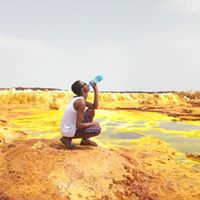
two liters per day as a minimum Carry some electrolyte powder that you can dissolve in water for cases of extreme dehydration. You can get it here.
Wear light cotton long pants and t-shirt, better if long sleeved so as to avoid getting sunburnt
Wear a hat or a bandana on your head to protect from the sun Minimize the amount of time you spend outside
Cities are chaotic
Cities in Ethiopia are mayhem and I recommend visiting just a couple when you travel in Ethiopia. Addis Ababa is a nightmare to get around, with the most congested traffic you can imagine – I think I have seen worse only in large Indian cities such as New Delhi. Other smaller cities may not have as much traffic, but they are chaotic nonetheless.
Just picture construction and road works everywhere; improvised markets sprouting at every corner; cars, tuk tuks, buses, trucks, bikes, horse pulled carriages, donkeys, goats and cows all trying to dodge the streets and the potholes, and you may get an idea of what to expect. It’s fun to observe, in a way!
The official language is Amharic

There are around 80 different languages spoken in Ethiopia, which include the official ones and the languages spoken by indigenous communities around the country.
Amharic is the official language of Ethiopia. You may want to try to learn a couple of words, but the fact that it has its own alphabet makes it extremely hard. The other main language spoken in Ethiopia is Oromo.
Though English is widely and well spoken in Addis Ababa and in the most touristy areas such as Lalibela or Gondar, when you travel in Ethiopia beyond Addis Ababa you’ll find that in other parts of the country people – even those working in the tourist industry – speak little or no English. Just be extra patient, as most people really do their best to understand you and to talk to you!
Ethiopia is on its own time system
This is a little complicated, really, and it can make travel in Ethiopia challenging at times.
The Ethiopian calendar is currently seven years behind the Gregorian one which is the one we commonly used – so they are currently in 2012. In fact, according to the Ge’ez calendar which is the one used in Ethiopia, there are 13 months in a year, 12 of which have 30 days. The 13th month has five or six days, depending on whether it is a leap year or not.
The good news is that you won’t really have to work out which day of the week it is, because working in the tourism industry normally refer to the Gregorian calendar when dealing with tourists. Yet, it is interesting to note how, when filling in the date for tickets to attraction, they indicate a different month and year!
You need a visa to enter
You will need a tourist visa to travel in Ethiopia. You can get it on arrival, and some people argue that the line to get the visa is just as long as the line that people who had previously arranged it. I actually think it is better to get the visa online – the line when I got to Addis Ababa airport were insanely long, whereas I had to wait no more than 5 minutes. You can obtain your visa here – it costs $50 plus $2 USD handling fee.
And you are better off with a good travel insurance
You really, truly, definitely don’t want to take any chances when you travel in Ethiopia: don’t forget to buy travel insurance before your trip. Get yours here.
Check out my post “Why You Need A Good Travel Insurance.”
Erta Ale Volcano
The Mars-like landscape of Erta Ale Volcano
Internet is hardly a thing
Trying to get online when you travel in Ethiopia is frustrating at best. The best internet is in Addis Ababa, and even there it is sparse.
While all hotels and guest houses have wifi for their guests, and wifi is available for free at all airports, this really works on and off and you will – at most – be able to get on Whatsapp or Messenger (though you won’t be able to send photos or videos to family and friends and to download voice messages). Facebook takes forever to upload, and Instagram too. You may be able to download emails – but attachments are hard to open.
If you want to bypass the government blocks you may want to invest in a VPN – there are several apps you can download directly on your phone. You may want to do this before visiting Ethiopia though!
Between the slow internet and the fact that the Ethiopian government regularly shuts down social media you may as well want to give up entirely and enjoy your trip without having to worry about getting online. Warn your family and friends that you won’t be getting online much and set up an out of office reply for your email and deal with it later, once you get home.
You may be able to get a local SIM – but not at the airport
I generally advise to get a local SIM card to stay connected when traveling – it usually is easy to get at airport kiosks. However, you won’t be able to find a ETC (Ethiopian Telecommunications Corp) at Bole International Airport, which means you’ll have to find an ETC shop in town and get in the forever line to get your card. Apparently you can also get a SIM card at the shop located on the ground floor of Hilton Hotel, and there is virtually no line.
Hostels aren’t common

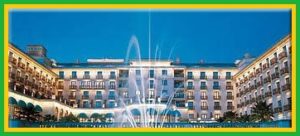
You won’t find many hostels when you travel in Ethiopia – these are simply uncommon there. There is Gondar Backpackers in Gondar, which is actually a really nice place, and where you will be able to use the kitchen.
Other than that, your best budget friendly choice will be local guesthouses, which are usually quite basic – you get a room with ensuite bathroom and internet for around $15 to $20 USD, usually including breakfast.
If you decide to book a hotel room via Booking.com (which is where most local hotels are advertised) make sure that you are assigned the room you have booked and paid for – hotels will often try to place you in a smaller, less expensive room than the one you have paid and it will take a bit of back and forth communication with the receptionist to get what you want. Make sure to download the Booking app on your phone (and to take screenshots of your booking) and be prepared to show your reservation until you get the room you have reserved.
shopping in Ethiopia

A shop in Aksum Tuk tuks are the most budget friendly way to go around The best way to go from one place to another in Ethiopian cities is a tuk tuk, locally known as bajaj. Make sure to call them that when looking for one, and by all means haggle the price!
Domestic flights are cheap
Ethiopia is a huge country and ground transportation tends to be a bit lacking. Long distance buses exist, but they aren’t frequent, and you may be forced to pay for an expensive private transfer to get from one place to the other.
The best alternative to cover long distances are domestic flights, which can be quite inexpensive especially if you flew on Ethiopian Airlines to get to Ethiopia. You will have to use your international flight reservation code to access the best deals for domestic flights.
Keep in mind that Ethiopian Airlines has a thing for changing the flight schedule, and may even reschedule you to fly on a different date than that you had originally booked. You may want to book your flights via a travel agent that can deal with the schedule changes and reschedule your flights for you.
You have to go through security twice at the airport
This is something that I can’t really explain, and that for some reason exhausts me. Upon getting close to the airport, you’ll find a road block where they military will ask you to show your passport. Before getting inside the terminal, you will have to show your passport again. Then, you’ll have to go through security – shoes off and all.
After checking in, you’ll have to wait in the main lobby until your flight is called and then you’ll have to go through security again.
Withdrawing cash is easy


Cash is king in Ethiopia, and you will need it to pay anything – from small fees to enter a museum, to restaurant bills and even tours. You can change cash at the airport as soon as you arrive (the exchange rate is the same you’ll get in town, but it’s much easier to get it done there).
Alternatively, you can withdraw cash easily at the many ATMs that can be found in any city. If you are planning to tour the Danakil, make sure to withdraw cash before as you won’t find any ATM in the desert!
visiting Ethiopia

Guided tours are a necessarily evil to reach the most inaccessible places Guided tours are (unfortunately) necessary
There is no way around it: whether you want to hike the Simien Mountains, visit the Tigray Churches or explore the Danakil Depression, you will have to join a guided tour.
I have always said that guided tours are a good thing – you get a guide, you get everything arranged for you, and the prices are usually convenient for what you get. But when you travel in Ethiopia, this isn’t necessarily the case.
Tour companies tend to charge random fees – so you’ll see people taking part in the exact same tour, each one of them having paid a different amount.
Paying more doesn’t necessarily mean getting a better service. More often than not you’ll experience accommodation which is between poor and unacceptable, with mattresses that would be better thrown in the garbage. Food is barely eatable. And the hygienic conditions of the places where you stop for meals are dire if not disgusting altogether.
And let me not talk about the guides and drivers. The average ratio is one guide for a group of 25 tourists – not nearly enough in places such as the Danakil where the conditions are very harsh and the guide should be keeping a close eye to the tourists, to keep them safe.
On occasions, you’ll have guides that speak no English at all, and that have no experience in guiding. I had this occur on my tour of the Tigray Churches and when I reported this to the tour company they literally shrugged the information off and said the guide had been recently hired and would be fired.

Food in Ethiopia
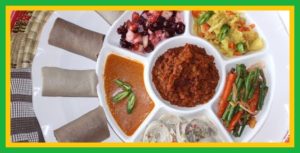
Fasting food – injera layered with various pulses and vegetables Injera is the main staple of Ethiopian diet
Whether you like Ethiopian food or not is purely a matter of personal taste. I found it to be quite repetitive, but other people I traveled with loved it.
The main staple of Ethiopian diet is injera, a sponge like very sour and thin bread made of teff flour which is layered with various dishes and which is used to scoop up food – unless you ask for it, you won’t generally be given forks to eat.
The nicest dish is shiro tegamino – a very thick, spicy chickpea paste. Injera firfir, on the other hand, is nothing more than injera layered with scrambled and even more sour injera.
Vegans have it easy

The one remarkable thing about Ethiopian food is that it is incredibly vegan friendly. Ethiopians are Christian copts and they observe a diet of fasting on Wednesdays and Fridays, whereby they avoid eating any sort of animal product. Sit at any restaurant and ask for “fasting food” to make sure you are served only vegan food.
Coffee is delicious
One thing that is always, consistently good in Ethiopia is coffee. Walking around cities small or large you will smell coffee being roasted. A cup of freshly brewed coffee will awaken your senses. For the best coffee, head to Tomoca in Addis Ababa. I honestly don’t think I have ever tried anything so good. Trust me, I drink lots of coffee.
Ethiopian beer
A bottle of Ethiopian beer Whereas wine and beer are just passable There is quite a decent variety of beers in Ethiopia, and even local wines. Local beer is definitely better than local wine. The best beers are St. George, which is commonly found in all restaurants and bars, and Habesha, which is the most refreshing one. Dashen is by far the worst among the local beers.
Water is not safe to drink

By all means, never have tap when you travel in Ethiopia – not unless you use a water filter. Water is not safe to drink, and you may get all sorts of bugs from it. Avoid salads and raw vegetables that may have been washed with tap water.
If you like sparkling water, opt for Ambo Water – it’s delicious.
It’s a safe country
For the most part, Ethiopia is a safe country and you shouldn’t encounter any major problems when traveling around. Keep your eyes open and belongings safe as incidents such as theft of wallets and cell phones is common in larger cities. I also recommend using your good judgement when walking around, especially at night, as cities tend to have poor illumination.
Yet, touts are common
Though safety is hardly an issue when traveling around Ethiopia, touts are. Faranji (white tourists) are the favorite target of people trying to sell stuff in the streets, self-professed tour guides, bajaj drivers and all sorts of beggars. The best way to avoid touts is to avoid any sort of eye contact. By all means never smile at them and if they do offer anything, a polite but firm no is necessary.
Children will ask for money
“Hello, money!” is the typical greeting you’ll get from children when you travel in Ethiopia. They will surround you as soon as you get off the car, or as they see you walk close to an attraction. They will call you, pull your clothes, pull your hand and at times even pinch you to get your attention and to demand money, pens, and at times even the clothes you are wearing.
Ignoring them or saying no is generally enough to make them desist. If you are even a tiny bit friendly with them (a simple hello, or a high five), chances are they will follow you for a long while, exhausting you.
I know it is harsh – they are just kids after all – but really! Be firm in this. These children should be going to school and not hanging out in the streets demanding money off tourists and if you give them even just a cent, you will be encouraging them to continue!
Care to be a more responsible tourist? Make sure to read my post “The Complete Guide To Becoming A More Responsible Traveler.”
travel in Ethiopia
Plastic waste is a major issue in the Danakil Depression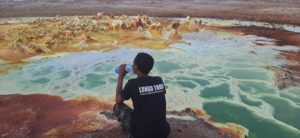
Hygienic conditions are inadequate
In most places you will see when you travel in Ethiopia, hygienic conditions are inadequate, with poor to no sanitation at times. Quite often the only toilet available is a squat one, with no flush and no running water at all. In many places, there are no sinks to wash your hands.
Some of the local “restaurants” where you’ll stop during your tour of the Danakil are beyond filthy – expect to see all sorts of garbage on the floor, with leftover food such as chicken bones, flies all over the place, and nobody taking care to clean. It will honestly test your guts.
You are bound to get food poisoning at some point
Everybody gets some level of food poisoning at some point or another when traveling in Ethiopia. My friend got sick on the third day of our trip and by then we actually thought it may be altitude sickness. I got sick with similar symptoms, but ten times worse, after more than 10 days of traveling, when I had fully adjusted to the altitude.
Try to eat only safe food – avoid things such as raw vegetables which may have been washed with tap water, and even rice, which gets easily contaminated.
Food poisoning symptoms include vomiting, nausea, diarrhea and fever. If you experience any of these make sure to get rest and drink plenty of fluids. Eat very plain stuff such as pasta with just oil, bread, and avoid anything spicy, creamy or cheesy.
Garbage and plastic don’t seem to be a huge issue
One thing that will positively surprise you when you travel in Ethiopia is that the roads are quite clean and that there is hardly any garbage around. Ethiopia is the first African country that established a waste-to-energy plant, located in Addis Ababa and which incinerates around 80% of the city’s waste and supplies around 30 per cent of its household electricity needs.
Except in the Danakil
The only part of Ethiopia where you’ll feel garbage really is an issue is the Danakil Depression. There, plastic waste is everywhere. As you walk along the lava flows of Erta Ale Volcano, you’ll see plastic bottles and other plastic waste in each and every crack. It’s sad to see the sheer beauty of the region ruined by so much plastic waste, and I truly wish something was done to clean it up and keep it clean.
visiting Ethiopia
Keeping your head covered is a must when visiting Dallol
Smart packing is essential
This is especially valid when you travel in Ethiopia if you are crossing several climates and may encounter both very cold and very hot weather. Make sure to carry only the bare essentials – you won’t really have any chance to dress up anyways. The following is a very basic packing list:
Two pairs of lightweight hiking pants. My favorite are Kuhl Horizn Straight and Kliffside convertible
A pair of thermal pants and a thermal shirt for the cold nights in the Simien Mountains. I swear by Kuhl Akkomplice Bottom and Akkomplice Zip Neck
A rain and windproof jacket such as Kuhl Airstorm and a warmer one such as Kuhl Firestorm Down Jacket A sweater or a micro fleece for the chilly evenings. Also take the Kuhl Alska which you can wear to sleep in the Simien
Two cotton long sleeve t-shirts. I love Kuhl Sora Hoody. Also take a couple of short sleeve ones such as Kuhl Valiant
A good pair of lightweight hiking shoes such as Salomon X Ultra 3 Low GTX
A pair of flip flops or alternatively sandals such as Teva Elzada
We repeat again below that you should not forget.
Benefits of an Ethiopian Travel Agency
But there are countless benefits to picking an Ethiopian Travel Agency. You will be mach sefer as Your tour guide knows all the common scams and danger areas and will steer you clear. Your chance of getting robbed or pick-pocketed are infinitely smaller.
Avoid the hassle.
In Ethiopia, there is an unbelievable amount of hassle. Drunk people following you on the street. Street kids, who bless their heart, won’t stop following you. Pick-pocketers galore. And endless amount of people hollering at you. A guide will make sure this doesn’t happen to you or at least significantly minimizes it. They’ll also pick up all the bills, handle money, and drive you around effortlessly (or as effortlessly as anybody can in Ethiopian traffic). This allows you to relax and actually enjoy the traveling experience.
Sidestep the hassle
Ethiopia has what is known as the “Habesha price” which is what Ethiopians pay and the “Forengi price” which is what they trick tourists into paying. Most of the time, it is 2 or 3x the actual price. It’s not that they are trying to be mean. But it’s a country of bartering. And if you don’t know how to play, then in their minds, that’s on you. The perks of having a tour agency is that the guide won’t let you overpay. He is on your side and will help you negotiate.
Learn More
There is a wealth of history and culture quirks in Ethiopia that is hard for newcomers to understand. Partly because the museums and other sightseeing don’t have comprehensive signs in English. Your tour guide will be able to explain it all to you. You’ll learn more. And you’ll laugh more (because some of the things here are hilarious when you learn the back story).
Public Transportation
There are public buses connecting most towns. But they are overly crowded. It’s not an exaggeration to say they will a 12 passenger van will hold 24 people, plus a few babies and chickens. And by the end of the ride, your shirt will be wet with sweat for the person beside you. The buses also stop every few minutes to let people get off and new people on. So a bus ride can take almost 2 or 3 times longer. It’s With an Ethiopian travel agency, you’ll have your own private, sweat-free ride. You can stop for lunch or the restroom whenever you like. And you’ll still get there faster. This frees up a lot of extra days so that you can see and more things
Clothing

We highly recommend to bring sunglasses and a hat for all areas of Ethiopia. Pack light clothes for the day time and a jacket or sweater for the chilly highland evenings and a good pair of walking shoes. Trekkers in the Simien and Bale Mountains will need jackets, warm clothes, thermals, waterproofs, and binoculars for viewing different animals. When entering the churches, the clothes have to be “respectful”, covering enough the body. Shoes must always be removed before entering churches and mosques – for travelling around sites like Lalibela with its many churches, airline socks are very useful.
Money
Money can be exchanged in the airport, in hotels and banks. Exchange requires a passport and the receipts should be kept, as re-exchanging back into foreign currency is difficult otherwise. The Ethiopian currency is the Birr (“Silver” in Amharic). VISA and MASTERCARD are accepted at the major hotels. There are many ATM’s available in throughout Addis Ababa
Colander
The year of the Ethiopian calendar contains 365 days to which is added every fourth year an extra day. Each year in this four-year period is dedicated to one of the four Evangelists who come in the following order: Mathew, Mark, Luke and John. The year of Luke is the Ethiopian Leap year and is the year which precedes the western leap year.
Language
Ethiopia is a multi-ethnic state with a variety of over 80 different languages spoken in the country, with 200 dialects. The main three languages are Amharic, Tigrigna and Oromigna. English is also widely spoken.
Food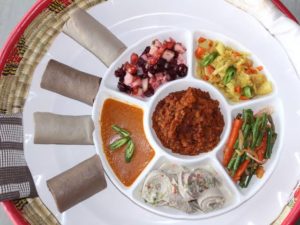
The Ethiopian national food is a communal dish of Injera with stews of meat and vegetables. Injera is a spongy flatbread made of fermented Teff grain. Meat dishes mainly consist of lamb, chicken and beef. There are a number of vegetarian options in traditional Ethiopian cuisine. Pork is rarely consumed in Ethiopia as both the Orthodox and Muslim religion forbid it. Addis Ababa and many other cities boast of a wide variety of international restaurants.
After enjoying a traditional Ethiopian meal, it is customary to participate in a traditional coffee ceremony. Enjoy the unique flavor of Ethiopian organic coffee.
Medical information
The possession of a valid Yellow Fever vaccination certificate is not mandatory. Immunization for Hepatitis A and B, Tetanus, Typhoid Diphtheria, Meningococcal, and Polio is recommended.
Malaria: in most of the sites malaria is not a problem because of the high elevation, e.g. Addis Ababa, Axum, Gondar and Lalibela. But it may occur in Bahir Dar at the end of the rainy season and after unseasonable rains. Lowland areas along the Awash River, the Omo Valley, Rift Valley and Gambella are subject to malaria outbreaks. Chloroquine resistant strains have been identified in most areas so you should consult your doctor about the prophylaxis.
Visitors should take a simple first aid kit, band aids, antiseptic cream, anti-histamine cream and/or tablets for insect bites, sunscreen (while temperatures are moderate, the sun is strong), anti-diarrhea tablets, mosquito repellent, broad spectrum antibiotics, and anti bacterial spray /cream.
Photography and money
Professional or high standard video equipment is difficult to be brought to Ethiopia. An official permission letter can be expensive. You may want to consult your local Ethiopian Embassy if you are bringing high standard equipment.
In many places, small fees are charged for photos taken of people, especially in the southern tribal areas of Ethiopia. Video fees can be very high in national parks and other guarded places.
Publick holiday
January 3: Birth of Prophet Mohammed (Mauwlid)*
January 7: Ethiopian Christmas (Gena)
January 19: Ethiopian Epiphany (Timket)
March 2: Anniversary of the Victory of Adwa (1896)
April 10: Ethiopian Orthodox Good Friday
April 12: Ethiopian Orthodox Easter Sunday
May 1: International Labor Day
May 5: Patriots Victory Day
May 28: Fall of the Dergue Regime
July 18: Eid Al Fitir (Ramadan)*
September 12: Ethiopian New Year
September 24: Eid al Adha (Sacrifice)*
September 28th: The Finding of the True Cross (Meskel)
Each year is divided into 12 months of 30 days. The extra 5 days are placed at the end of the year and known as Pagumen. In the leap year the extra day is added to these five days making the Pagumen of this year a period of 6 days.
Names of months are as follows: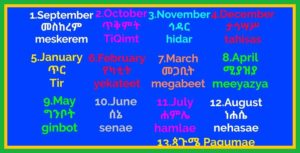
(1) Meskerem (September-October)
(2) Teqemt (October- November)
(3) Hedar (November- December)
(4) Tahsas (December- January)
(5) Ter (January- February)
(6) Yekatit (February- March)
(7) Megabit (March- April)
(8) Miyazia (April – May)
(9) Ginbot (May – June)
(10) Sene (June – July)
(11) Hamle (July-August)
(12) Nehase (August- September)


